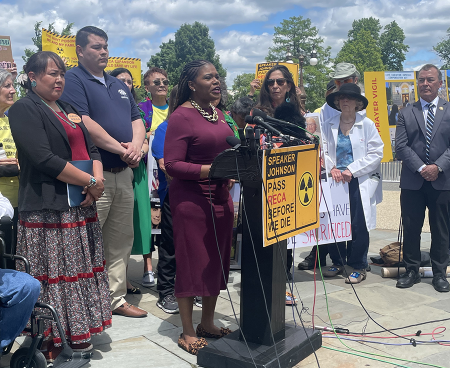"No one can solve this problem alone, but together we can change things for the better."
Congress Lets Aid Program for Downwinders Expire
July/August 2024
By Chris Rostampour
A federal program that has aided thousands of people in communities harmed by U.S. nuclear testing and weapons production activities expired June 7, and it is unclear whether it can be revived.

Since the Senate voted in March to extend and expand the Radiation Exposure Compensation Act (RECA), Speaker Mike Johnson (R-La.) has not scheduled a House vote on the Senate bill or any variant.
Lawmakers continue to debate how they could salvage the program, but Rep. Cori Bush (D-Mo.) told a press conference May 17 that Johnson’s office has cited high costs as the reason for not acting. Later, she told Arms Control Today that she finds the argument ironic because the government always seems to have “money for war and weapons.”
To date, the RECA program has approved claims totaling $2.7 billion for 40,000 people, according to the Justice Department. The Congressional Budget Office estimated the future cost of the Senate-approved bill at $50 billion over 10 years.
Originally passed in 1990, RECA established a program to provide health screening and one-time payments to people harmed by exposure to radiation from atmospheric nuclear testing or uranium mining. It was limited to those who lived in 22 largely rural counties of Arizona, Nevada, and Utah between 1951 and 1958 and in the summer of 1962 and had developed leukemia or one of 17 other kinds of cancer.
The program also covered uranium workers from 1942 through 1971 who could document a subsequent diagnosis of diseases that are deemed eligible for compensation. Numerous health studies since 1990 have shown that fallout from past nuclear tests did not stop at the county or state lines recognized under the original RECA program.
The Justice Department announced in June that it is no longer accepting new claims, saying that “only claims postmarked on and before June 10, 2024, will be filed and adjudicated.” But health facilities continue to offer screenings for cancer and other radiation-induced illnesses. The U.S. Health Resources and Services Administration said health facilities providing screening under RECA “would remain active” for the time being, Radio KJZZ in Arizona reported.
The Senate bill, sponsored by Sens. Ben Ray Lujan (D-N.M.), Mike Crapo (R-Idaho) and Josh Hawley (R-Mo.), would extend RECA for six years and expand the program to communities that previously were excluded. This would include people in New Mexico affected by the first nuclear test explosion and communities in Missouri and Kentucky dealing with contamination from Manhattan Project-era uranium operations. The Senate passed the bill 69-30 in March. President Joe Biden has said he would sign it if it arrived on his desk.
Since the Senate vote, lawmakers from both parties and activists have urged Johnson to hold a House vote on RECA, either as a stand-alone bill or as an amendment to another legislative vehicle. (See ACT, May 2024.)
In mid-April, Utah Republican Sens. Mike Lee and Mitt Romney, who both voted against the Senate-approved bill, introduced legislation to extend RECA for two years without expanding coverage. In late May, Johnson announced that the extension legislation would be put to a vote, but later pulled it from the House calendar due to opposition from downwinder communities and Hawley, who called the move inadequate and vowed to block the bill if taken up by the Senate.
In a May 7 letter to House leaders, dozens of downwinder communities and organizations wrote, “Our communities
have been suffering under this injustice for many decades, and it cannot continue. Congress must improve RECA to include many communities that have been excluded and abandoned by our government.”
Tina Cordova, a nuclear exposure survivor from New Mexico and a long-time advocate of expanding RECA, told KOBTV that “while they play politics, we’re gathering up our resources for someone to have cancer treatment.”
